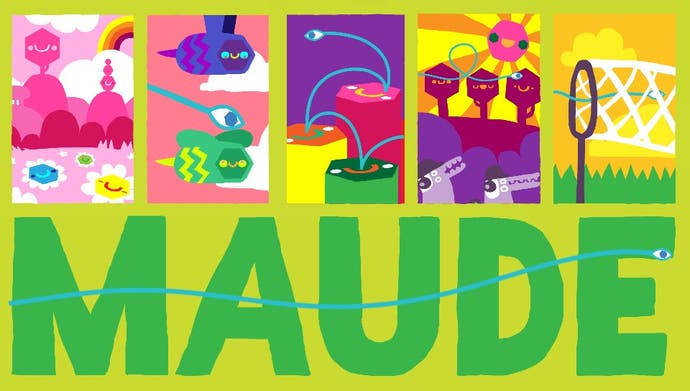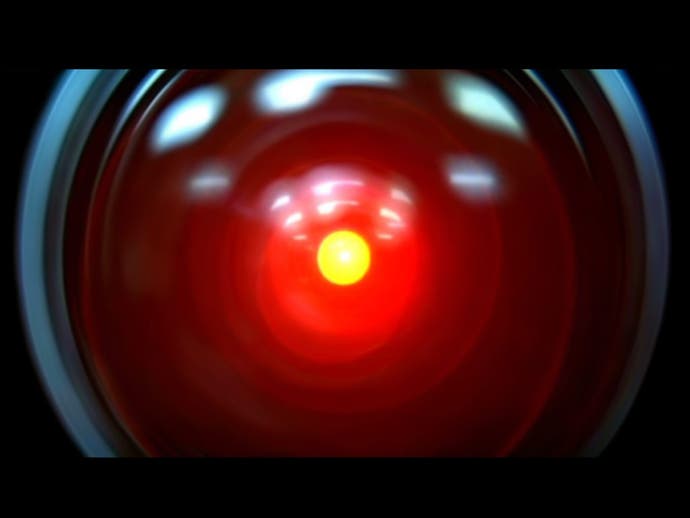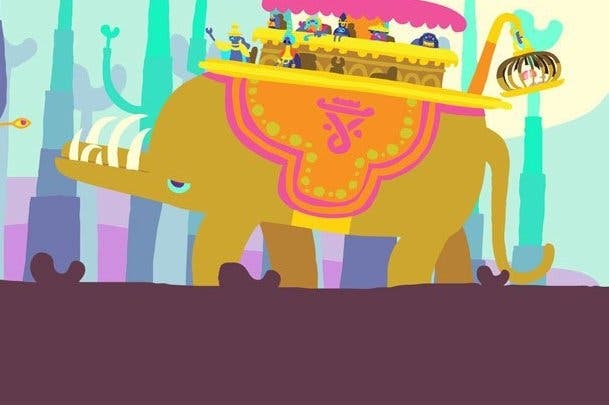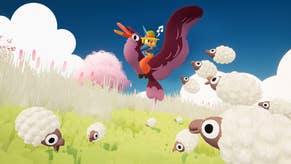Hooray for games that are hard to talk about
Words, words, words.
The secret to a happy cultural life - for me at least - is disarmingly simple. I do not feel, and I have never felt, the need to understand something in order to enjoy it. This is almost certainly a weakness in a person who writes about video games, but can we leave that to one side? Join me. Join me in the warm depths of misunderstanding - or simply not understanding. My experiential life is a bubble bath forever topped up with lovely warm water.
This approach does not get in the way as much as you might think, either. When it comes to books, I'm a massive fan of Herman Melville and Thomas Pynchon - regardless of the fact that they are both writers who create, as a byproduct of their fiction, pages and pages of dense complexity in the form of scholarly articles and presentations, many of which include diagrams. No matter. I enjoy their work on whatever level is available to me as I read it. I love to watch the sinew of a Pynchon sentence as it glides and curves and flexes through a Pynchon paragraph. I love to look up the odd word in a Melville novel - a word like "scrimshaw", which turns out to be the kind of etching a bored sailor might create using a needle and a bit of animal bone or tooth. I'm sufficiently trivial to ensure that I bring no expectations regarding the rewards for reading, so everything that comes out of it is a bonus.
Sometimes, letting things flow over you feels like just the right way to experience them, in fact. Melville once said that there is "a special halo about a horse," for example. I appreciate what he means exactly, even though I would not like to have to elbow myself up from the sofa and explain my appreciation to a third party clutching a notebook and a pen. The idea simply strikes a tuning fork against the part of my brain concerned with horses, and the part concerned with haloes.

And then there's PSN game Hohokum - or, to be more precise, Hohokum's first level. Have you played it yet? Hohokum's first level is utterly sensational. It is the loveliest thing I have played all year, and I almost don't want to explain why. Partly because I suspect that would be very difficult and I already have a bit of a headache. Partly, though, because the act of explaining might ruin the pleasure of the experience.
Let's see how much I can get away with. Hohokum casts you as a colourful snake-type, sperm-type thing, but really, I suspect, you're actually playing as an idealised doodle. This is fitting, really, because the thing you're gliding and curving and flexing through strikes me as being a designer's notebook as much as a game. There are ideas everywhere, some densely realised, some sketched in with haste, some started and perhaps partially abandoned. The organising principle is the simplicity of the controls - go fast, go slow, curve, and bump against stuff to activate it. Everything else is up for grabs. Everything else belongs to the Whim Economy.
And the first level is where this all becomes clear - a series of rounded chambers, linked together and filled with objects that are fun to butt heads with. As you explore, lights and colours ripple across the walls. Some things are machines. Some things are rudimentary switches. As you travel you collect other snake-type doodles who move alongside you, but with just enough of a hint of free will to make them feel like companions rather than automatons. Reach certain rooms and these companions mirror your movements perfectly. It's like being in control of a spirograph - you can make those funny, looping, star-like shapes you often find on money. Or you can simply leave the room and find something else to play with.

It is so delightful to slide through the first level of Hohokum, because it tells me that, in a mild and insignificant sort of way, I have been a bit mixed up. It tells me that I suffer from a common delusion amongst those who write about games - the delusion that the experience of playing a game can be converted into language, and that this language then becomes useful or illuminating. I played through the first 10 minutes of Hohokum a few days back and it felt like a diagnosis. I realised there was no way to satisfactorly turn what was happening into words - it was not meant to work as words. It goes back to the idea of a notebook, I think. You don't have to explain the context to yourself when you're making a note. You just get the fleeting gist of the thing down quickly and trust your mind to put the rest together when you eventually come back to it.
When I first played Hohokum, I worried that the innate wordlessness of the game would not last. I wasn't concerned that the developers would have to resort to tutorials or quest text, but more that the game would eventually settle into a structure, and the structure would give me a little too much organising shape to hang onto, thus destroying the pleasant sensation of just floating through something that's so surprising and sweet-natured and generous. There is structure here - worse yet, it revolves around collecting things - but luckily it's always loose enough to allow each new environment to present its own twists, to muddle its own rules, and then to fling them at you so lethargically that you never really feel compelled to do anything that isn't immediately pleasing.
People often talk of being lost in a game, and this is so literally true of Hohokum - not just because the game is a series of distinct spaces separated by holes and not just because there is no map, but because the very spaces you visit resist the language needed to make your own map or to describe an easy journey to others. This is where you sense the whole project's single jolt of energising prickliness, in fact: if you want to go somewhere specific in Hohokum before you've opened up the shortcut, you're going to need to remember a long, rambling, and inevitably indescribable route. For once, you're going to need to bend and flex and curve to Hohokum's will.
I wouldn't want every game to behave like this, but it is so lovely when the odd one has the bravery to ditch the metalwork other titles need to clamp on - plot, upgrades, the familiar ding! of a level being hit or a turn coming to an end. I love all those things, but Hohokum and games like it have a peculiar kind of purity to them - the purity of a game that is sufficiently confident in itself to know that it does not need to make sense every moment of its existence.
And I think it would be wrong to associate this kind of approach with a lack of rigour. Maybe it's just a different kind of rigour. Stepping outside of games for a moment, Hohokum - or the fact that it's at its best when it's making you forget its loops, its rituals, its objectives - reminds me a little of a story I once read about Stanley Kubrick, a man possessed of so much rigour that he had his own document boxes designed for the safe organisation and storing of the paperwork he needlessly retained from the movies he had already made. Testify: a man with so much rigour that he wanted the stuff he would never look at again to be neat and tidy and easily accessible.

Anyway, a few weeks before the release of 2001: A Space Odyssey, Kubrick edited the film down to the point where it no longer made much sense - or rather, to the point where it no longer made the kind of sense people so often expect from a film. He took out an explanatory voice-over which would have absolutely strangled the Blue Danube sequence, for example, and - crucially - he chopped away scenes that were intended to reveal, in bland, Clarke-ian, digestible detail, why HAL, the movie's boiling hot anti-hero, decides to go mad and kill everyone. He saved one of cinema's most imponderably great villains from a dusty life as a plot point: understood, defanged, forgotten.
Kubrick, like the developers of Hohokum, found a position in the Whim Economy where the work could shine. You know, a place where there are no words knocking about to kill the atmosphere and to stir your inner monologue - your inner taxonomist - into pedantic, classifying, minimising life.
That's genius even I can understand.













